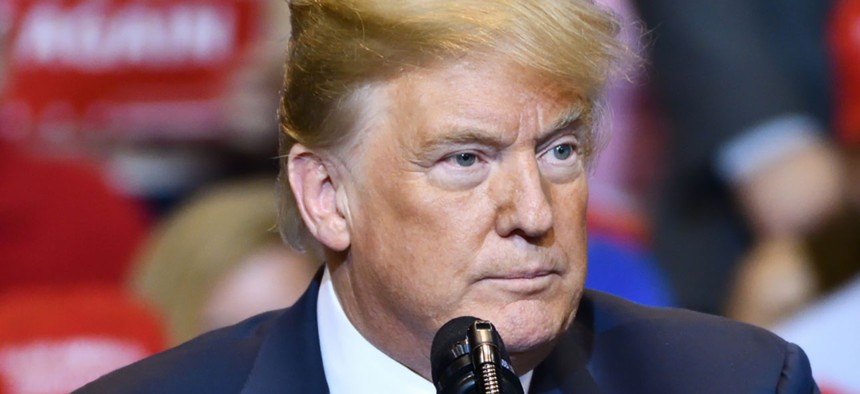
Evan El-Amin / Shutterstock.com
A Supreme Court Case Could Liberate Trump to Pardon His Associates
Gamble v. United States isn’t related to the Russia investigation. But the outcome—which one senior Republican senator has tried to influence—could still have consequences for the probe.
A key Republican senator has quietly weighed in on an upcoming Supreme Court case that could have important consequences for Special Counsel Robert Mueller’s Russia investigation.
The Utah lawmaker Orrin Hatch, who sits on the Senate Judiciary Committee, filed a 44-page amicus brief earlier this month in Gamble v. United States, a case that will consider whether the dual-sovereignty doctrine should be put to rest. The 150-year-old exception to the Fifth Amendment’s double-jeopardy clause allows state and federal courts to prosecute the same person for the same criminal offense. According to the brief he filed on September 11, Hatch believes the doctrine should be overturned. “The extensive federalization of criminal law has rendered ineffective the federalist underpinnings of the dual sovereignty doctrine,” his brief reads. “And its persistence impairs full realization of the Double Jeopardy Clause’s liberty protections.”
Within the context of the Mueller probe, legal observers have seen the dual-sovereignty doctrine as a check on President Donald Trump’s power: It could discourage him from trying to shut down the Mueller investigation or pardon anyone caught up in the probe, because the pardon wouldn’t be applied to state charges. Under settled law, if Trump were to pardon his former campaign chairman Paul Manafort, for example—he was convicted last month in federal court on eight counts of tax and bank fraud—both New York and Virginia state prosecutors could still charge him for any crimes that violated their respective laws. (Both states have a double-jeopardy law that bars secondary state prosecutions for committing “the same act,” but there are important exceptions, as the Fordham University School of Law professor Jed Shugerman has noted.) If the dual-sovereignty doctrine were tossed, as Hatch wants, then Trump’s pardon could theoretically protect Manafort from state action.
If Trump were to shut down the investigation or pardon his associates, “the escape hatch, then, is for cases to be farmed out or picked up by state-level attorneys general, who cannot be shut down by Trump and who generally—but with some existing limits—can charge state crimes even after a federal pardon,” explained Elie Honig, a former assistant U.S. attorney in New Jersey. “If Hatch gets his way, however, a federal pardon would essentially block a subsequent state-level prosecution.”
A spokesman for the senator denied that his brief was inspired by the Mueller investigation, noting that Hatch has “worked for years to address the problem of overcriminalization in our federal code” and wants the Court “to reconsider the rationale” for the doctrine “in light of the rapid expansion of both the scope and substance of modern federal criminal law.”
But while Hatch has earned his bona fides in the arena of criminal-justice reform, the timing of his filing is nevertheless significant. For months, the Gamble case has been analyzed through the lens of the Mueller investigation, and Brett Kavanaugh, Trump’s nominee to replace the retired Supreme Court Justice Anthony Kennedy, could be on the bench by the time the Court reconvenes this fall. The justices decided to hear the case one day after Kennedy announced his retirement.
On its face, Gamble is entirely unrelated to the Mueller probe. It arose from the prosecution of Terance Martez Gamble, who was convicted of robbery in Alabama in 2008. His conviction meant that he could not legally own a firearm, but police found a gun in his car after pulling him over for a broken taillight in November 2015. Both state and federal prosecutors charged Gamble with the same offense—being a felon in possession of a firearm—based on the same incident, resulting in an extension of his prison sentence. He has repeatedly appealed, arguing that the dual convictions violate the double-jeopardy clause.
The federal government, meanwhile, has argued that overturning the dual-sovereignty doctrine would upend the country’s federalist system. It’s further claimed that the phenomenon of overcriminalization—which Hatch has railed against—makes states’ ability to preserve their own sphere of influence and prevent federal encroachment on law enforcement more important, not less.
Paul Rosenzweig, a former senior counsel on the Whitewater investigation who serves as a senior fellow at the conservative R Street Institute, said he thinks the Hatch brief is “wrong substantively.” “If overfederalization of crime is a problem, we should stop overfederalization,” Rosenzweig said. “Hatch’s answer is to end federalism.”
But he cautioned that the case’s implications may not be as significant as they seem. “It is at least plausible that if the Court gets rid of the [doctrine], it would mean that an acquittal in state court would prevent a second trial in federal court and vice versa,” Rosenzweig told me. But Trump’s pardon power is “explicitly limited in the text of the Constitution to pardons for ‘offenses against the United States,’” Rosenzweig said. If that language is interpreted to mean federal criminal offenses specifically, a Trump pardon wouldn’t protect against a state criminal prosecution, he said, no matter what happens to the double-jeopardy clause in Gamble.
Amid this legal murkiness, “overall” one thing is clear, Rosenzweig said: “A result overturning 200 years of dual sovereignty would very much muddy the waters.”






